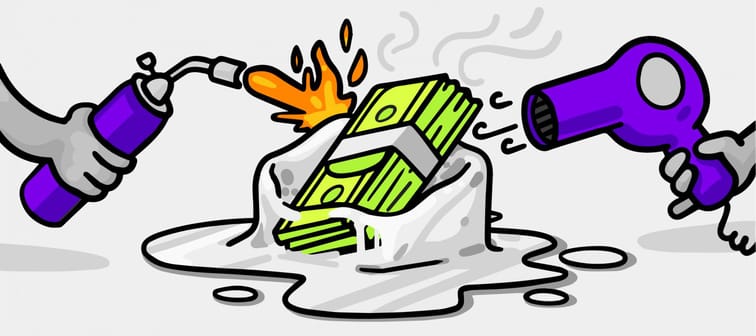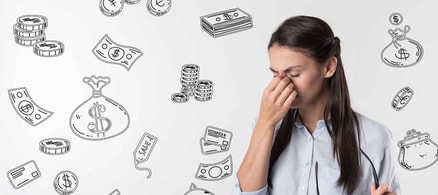Your emergency fund
If you have one, now’s the time to tap your rainy day emergency fund. But because putting away that back-up money can be a tough and long process, some people stubbornly resist taking out that cash even when they need it.
If the problem is that you’re not completely sure your situation constitutes a true emergency, consider the reason: Will this situation get worse and cost you more money down the road? Does it involve keeping a roof over your head, keeping your job, keeping you out of the hospital or keeping you out of court?
If the answer to any of those questions is yes, make a plan to repay yourself and rebuild your cash stash — then go make that withdrawal.
But remember: A real emergency never involves restaurants, clothing, holidays or any event that requires a bathing suit.
Kiss Your Credit Card Debt Goodbye
Having a single loan to pay off makes it easier to manage your payments, and you can often get a better interest rate than what you might be paying on credit cards and car loans.
Fiona is an online marketplace offering personalized loan options based on your unique financial situation.
When you consolidate your debt with a personal loan, you can roll your payments into one monthly installment. Find a lower interest rate and pay down your debt faster today.
Get StartedTap your IRA
Roth IRA
You can withdraw the money you’ve contributed to a Roth IRA at any time without paying taxes or penalties. However, earnings on your contributions are off-limits until you’re at least 59-1/2 and the account has been open for five years.
You’re tapping your retirement money, so make sure you’ve got a real emergency on your hands.
Regular IRA
This can be a risky move but, if you’re absolutely sure you can repay the money within 60 days, you can withdraw money from a regular IRA.
If you don’t replace the money on time, however, you’ll be hit with taxes and, if you’re younger than 59-1/2, an additional 10% penalty. Again, this is retirement money, so be very careful.
More: Common and costly IRA mistakes to avoid
Gift cards
More than half of all U.S. adults have at least one unused gift card gathering dust, an amount that’s estimated to total $15.3 billion.
In the case of a cash card, such as one from Visa, MasterCard or American Express, you can cash in the card through Google Pay, Square, PayPal and Venmo, usually for a fee of up to 3%.
You also can use a cash card to buy other gift cards, often at a discount. You also can use a cash card to pay online bills.
For store-specific gift cards, you’ve got the option to re-sell them for less than face value at several websites, including Cardhub.com, Cardcash.com, ClipKard.com, GiftCash.com and others.
Another tactic is to ask friends and acquaintances who regularly shop at those stores for which you have cards to swap cash for your cards.
Stop overpaying for home insurance
Home insurance is an essential expense – one that can often be pricey. You can lower your monthly recurring expenses by finding a more economical alternative for home insurance.
SmartFinancial can help you do just that. SmartFinancial’s online marketplace of vetted home insurance providers allows you to quickly shop around for rates from the country’s top insurance companies, and ensure you’re paying the lowest price possible for your home insurance.
Explore better ratesAdjust your tax withholding
If you’re in the habit of getting a big tax refund every year, that means you’re giving Uncle Sam an interest-free loan on your money until next tax season. Instead, adjust your tax withholding so that you get that cash now in your regular paycheck.
You can get a very good estimate of your tax bill using the IRS withholding calculator at www.IRS.gov. You’ll need your latest pay stub and last year’s tax return. The calculator checks your tax liability and will even instruct you how to change your withholding forms with your employer.
More: How much of your paycheck goes to taxes?
Review your insurance benefits
If you’re stretched for cash because of a mishap, accident or disaster, check out your insurance policies. Your home insurance policy might pay for ruined electronics and even spoiled food and hotel stays after a power outage.
If items are stolen from a hotel or dorm room, they may also be replaced by your insurance. Your car insurance often will replace a cracked windshield. And if the stash of cash or gift cards in your sock drawers burns up in a fire, some policies will replace your lost currency, too.
Forgotten bonds
Did a generous grandparent, uncle or aunt give you savings bonds over the years for birthdays, graduations, bar mitzvahs or other big occasions?
In many cases, these uncashed bonds stopped earning interest years or even decades ago and are languishing forgotten in a desk drawer or file cabinet.
According to the U.S. Treasury, Americans are sitting on a total of $29 billion in unredeemed savings bonds. You can look to see if any exist under your name by using the search tool at TreasuryHunt.gov.
Borrow against home equity
With property values at record levels, homeowners are sitting on about $29 trillion in home equity.
Although interest rates have ticked up lately, a home equity loan or line of credit can be an affordable way to tap the value of your home without selling the property. Typically, homeowners with good credit can borrow up to 80% of their equity.
August rates averaged just above 6% for home equity loans, and about 4.5% for lines of credit.
A loan is typically for a fixed amount at a fixed rate, while a home equity line of credit(HELOC) carries a variable rate and allows you to withdraw money as you need it. Most loans and lines are interest-only for 10 years, after which they need to be repaid or refinanced.
But be careful when borrowing against your equity. If you default on the loan, you can ultimately lose the property.
401(k) loans
If you have a 401(k) or similar workplace account, many plans allow you to borrow money from the plan and repay it with automatic withdrawals from your paycheck.
The payback period usually is set at five years, but you can repay the loan faster with no penalty. The loan limit typically is 50% of your account balance or $50,000, but varies from plan to plan.
Advantages of a 401(k) loan are that they’re usually fast and easy to obtain, regardless of your credit score, and that you will be paying interest to yourself, not a bank or other lender.
One downside is that the money you withdraw will no longer be earning money in your investments until it’s repaid. In some cases, however, your interest payments may amount to more than your investments were earning, depending on how the market performs.
Also, if you leave your job before the loan is repaid you’ll be hit with taxes and early withdrawal penalties.
Cash out life insurance
If you’ve got whole life or “permanent” life insurance, those policies often build cash value over time. One option is to cash out the policy and replace it with cheaper term insurance, which still leaves your survivors covered in an emergency but won’t build equity.
More options to access quick cash
Here are a few more ideas, just in case you need them:
- Loans from friends or family (put it in writing)
- Gig economy work, such as Uber driving, baby sitting, freelancing
- Sell unused items on eBay, Craigslist.com, to consignment stores or in a garage sale
- Check for unreimbursed business expenses and submit those claims
- Deliver pizza, wait tables or other weekend and after-hours jobs
- Check with your local United Way, church or temple for financial assistance
- Rent out a room in your home
- Search for unclaimed security deposits, old bank accounts, insurance payments and other cash at https://www.usa.gov/unclaimed-money and at https://fiscal.treasury.gov/unclaimed-assets.html.
The options you choose will depend on how much money you need and how soon you need it. But whatever method you choose, once you can get back on your feet, remember to start an emergency fund before your next cash crunch hits.
Sponsored
Follow These Steps if you Want to Retire Early
Secure your financial future with a tailored plan to maximize investments, navigate taxes, and retire comfortably.
Zoe Financial is an online platform that can match you with a network of vetted fiduciary advisors who are evaluated based on their credentials, education, experience, and pricing. The best part? - there is no fee to find an advisor.







